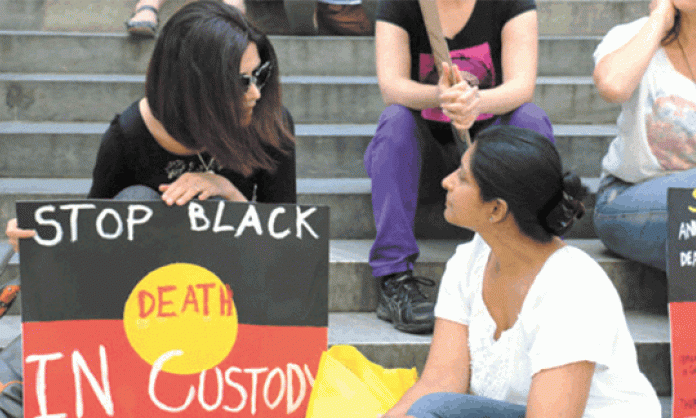On 4 August last year, the Dhu family received a shattering phone call. They were told that their daughter, Yamatji woman Julieka Dhu, had died in police custody. They later learned that her death – in a prison cell in South Hedland, WA – had been slow and that her last hours were spent in pain. One year on, her family are still waiting for answers.
Dhu was in prison for unpaid fines, of around $1,000. She was picked up after police received a call about domestic violence. When they discovered she had fines owing, instead of taking her to a refuge, they took her to the South Hedland jail. There, she became desperately ill, and repeatedly complained to staff. She was twice taken to the local hospital, and twice sent back, having never seen a doctor.
Shaun Harris, Julieka’s uncle, told Red Flag, “We had to wait so long to get Julieka’s body back. Here we are one year later – still no medical records, still not knowing what happened to her”.
Julieka’s is the 339th Aboriginal death in custody since a royal commission into the issue almost three decades ago. Harris and the Dhu family have faced a wall of silence and evasion from authorities. They have spent the past year campaigning for justice. They want the truth, and an inquest into her death, as well as conviction of those responsible.
“After we put together a timeline of what had happened, we put the call out for a national day of protest. There were people we knew, family and friends in all the major towns and cities. And people we had never met before”, said Harris.
Hundreds of people rallied in Perth last August in the wake of Julieka’s death. The Dhu’s campaign received so much attention that WA Liberal premier Colin Barnett was forced to meet with the family in the South Hedland lockup where Julieka was imprisoned.
At the Perth rally, the premier said that he would make a “personal commitment” to stop Aboriginal deaths in custody and address the number of Aboriginal people in prison. However, given his government plans to close 150 remote Aboriginal communities, his words were an insult.
After 12 months of campaigning, the Dhu family have finally got their inquest, scheduled for November 2015. It’s a start, says Harris, but they want more.
“We’re glad we got an inquest, but [the police] need to be held accountable. We shouldn’t have to have an inquest at all, because she should still be here. Justice for Julieka means a conviction for those who did this”, he said.
“[Deaths in custody are] a reality for First Nations people and indigenous people worldwide. Being put in a WA lockup is basically a death sentence. People are still being locked up for stealing bread, for unpaid fines. The whole system has racism flowing through.”
The WA government recently announced that the Aboriginal Legal Service, one of the few lifelines available to help Aboriginal people navigate the justice system, will be cut completely from the towns of Roebourne and Karratha. Harris points to this service as vital to preventing deaths in custody.
When asked what he would like to say to the police and the state government, Harris says, “Stop treating us like fucking animals. You’re getting away with murder. You’re getting away with genocide”.
“It’s been a long road. But our time will come, and we will get justice for Julieka.”




